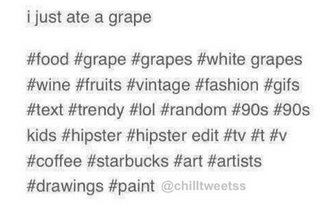Just going to throw that out there and assume. Let me give you one little piece of advice, though: DON'T. It's not worth it in literally every situation of your life but especially here. Self-generated blog entries are a billion times harder if you have to think of all your topics at once. Pace yourself. If you look far back enough, I wrote a whole blog entry on procrastination and down at the bottom I have some self-help links for your viewing.
ANYWAY, blogging is totally what you make it. If you think it is going to totally suck, like I did, it will either be kind of okay or it will ruin your life. Strangely enough, I don't totally hate it now. I just probably won't ever do it again.
FUN FACT: I FINALLY LEARNED HOW TO PUT PICTURES IN WITH THE TEXT. Just drag it. You're welcome.
The goal of blogging was to allow us to find our voices in writing or something like that. I'm 900% sure Professor Nielson worded it more eloquently than that but let's pretend that my wording is good enough. This can do that, if you let it. It can also let you run your writing into the ground, I'm sure, too. See, a lot of this blogging experience is dependent on you which is kind of the cool part about it.
| or not, if you don't want to be. |
Your growth depends on how much you want to grow and how much this sucks correlates with how much you want it to suck (subconsciously of course). That's the challenge. Are you going to push yourself to succeed or not? It's your choice.
Now let's talk about what I learned from all of this. I learned that blogging is about a billion times more challenging than I thought it could be and, while I still think blogs are pretty pointless, I have a lot more respect for people who do it than I did before.
I learned that there is a whole other world of writing that I had not explored before because my previous writing experience had been ruled by schoolwork. It also allowed me to learn to be more comfortable with myself which made essay writing a little easier although it is possible that this newfound comfort has made my writing too casual. We'll see. I don't think this process taught me anything about being a student, though. I've been in college for three years now and while most of my courses have been music related, I'm pretty comfortable in a school setting at this point in my life.
I think some people want blogging to be this crazy, life-altering experience. The truth is: it isn't. In this situation I guess it gave me an opportunity to learn more about my classmates but, realistically, when looking through and commenting on other blogs the goal is to just find one that doesn't hurt your eyes and talks about something just not-stupid enough to respond to. A list of links hardly makes the blogs of classmates seem enticing and so it wasn't necessary to go through and look or learn about others so it kind of makes the whole writing the blog thing seem like a waste of time.
With all of that being said, this whole blogging thing has been an eye-opener for me and it probably will be for you, too. Just roll with it and see where it takes you! It has helped me and I didn't even want it to so I bet it can be beneficial for you as well. Yes, I still think it is kind of annoying but I almost kind of like it now, too.
But, then again, I'm just some random college kid you don't know. By the time you see this you'll be sitting in a classroom thinking you know everything and what I say doesn't matter.
That's okay.
Sincerely, Samantha Barthel




